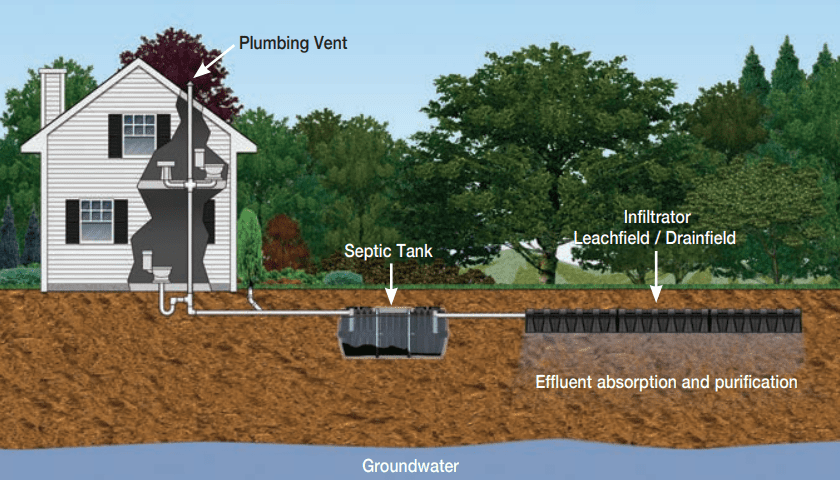Septic System Maintenance Tips for Homeowners
Proper septic system maintenance is essential for avoiding costly repairs, preventing environmental contamination, and keeping your home’s plumbing in optimal condition. Regular upkeep extends the life of your septic system and ensures it operates efficiently. Here are key tips to maintain your septic system and avoid common pitfalls.
Understanding How Your Septic System Works
The Basics of a Septic System
A septic system processes wastewater from your household, separating solids and liquids. The solid waste settles in the septic tank, while liquid wastewater flows out to a drain field, where it filters naturally. Over time, solids accumulate, making regular maintenance essential to prevent blockages and backups.
Why Septic System Maintenance Matters
Without proper care, your septic system can malfunction, leading to sewage backups, foul odors, and expensive repairs. Routine maintenance helps preserve the balance of bacteria that break down waste, ensuring your system functions smoothly and safely.
Essential Septic System Maintenance Tips
1. Schedule Regular Septic Tank Pumping
Routine pumping is crucial for maintaining your septic tank. As solids build up over time, they can reduce the tank’s capacity and lead to blockages.
– **Frequency of Pumping:** Most experts recommend pumping your septic tank every 3-5 years, depending on household size and water usage. A professional septic service provider can assess your tank’s needs and help you establish a pumping schedule.
– **Why Pumping Matters:** Regular pumping removes solid buildup, preventing clogs that can lead to sewage backups and damage to the drain field.
2. Use Water Efficiently
Excessive water use can overload your septic system, especially if wastewater floods the tank faster than it can process.
– **Conserve Water:** Spread out activities that use large amounts of water, like laundry and dishwashing, to reduce strain on the system.
– **Install Water-Efficient Fixtures:** Low-flow toilets, showerheads, and faucets help reduce water usage, extending your septic system’s lifespan and preventing overload. https://supremeplumbingandwastewater.com.au/hot-water-systems-townsville/
3. Avoid Flushing Non-Degradable Items
Certain items can clog your septic system, leading to backups and expensive repairs. Only flush septic-safe toilet paper.
– **Items to Avoid Flushing:** Do not flush wipes, feminine hygiene products, diapers, paper towels, or other materials that don’t break down quickly.
– **Educate Household Members:** Make sure everyone in your home understands what can and cannot go down the drain.
4. Use Septic-Safe Cleaning Products
Cleaning products containing harsh chemicals can disrupt the balance of bacteria in your septic tank, affecting its ability to break down waste.
– **Choose Septic-Safe Products:** Look for products labeled as septic-safe or those with natural ingredients, like vinegar and baking soda, to clean your household safely.
– **Avoid Anti-Bacterial Cleaners:** Anti-bacterial soaps and cleaners can kill essential bacteria in the tank, so opt for gentler alternatives.
5. Protect Your Drain Field
The drain field is a vital component of your septic system. Damage to the drain field can result in costly repairs and contamination risks.
– **Avoid Parking or Building on the Drain Field:** Heavy weights can compress soil and damage the drainage system.
– **Divert Rainwater and Runoff:** Ensure gutters, downspouts, and other water sources are directed away from the drain field to prevent flooding.
– **Plant Grass, Not Trees or Shrubs:** Tree and shrub roots can damage the drain field pipes. Grass, on the other hand, helps absorb excess moisture without causing harm.
Preventing Common Septic System Issues

Limit Household Waste Disposal
Overusing garbage disposals can increase the amount of solid waste in your septic tank, requiring more frequent pumping.
– **Avoid Using Garbage Disposals:** Reduce solid waste by composting food scraps when possible. Garbage disposals introduce organic waste that can strain the septic system.
– **Scrape Plates Before Rinsing:** By scraping food scraps into the trash or compost, you reduce the risk of clogs and extend the time between pumpings.
Inspect and Maintain Your Septic System Regularly
Routine inspections help detect small issues before they become costly repairs. Hire a professional to assess your septic system every 1-2 years.
– **Hire a Licensed Inspector:** A certified septic professional can check for leaks, check tank levels, and inspect the system’s overall functionality.
– **Identify Early Warning Signs:** Inspectors can spot issues like cracks, leaks, and root intrusion before they escalate, saving you money and hassle.
Avoid Harsh Chemicals and Additives
Some products claim to improve septic system performance, but they often do more harm than good. Chemical additives can disrupt the bacteria in your tank.
– **Avoid Chemical Cleaners:** Avoid pouring bleach, drain cleaners, and other harsh chemicals down the drain, as they can kill beneficial bacteria.
– **Skip Septic Additives:** Additives are rarely needed and can disrupt the natural breakdown process. A balanced system with proper maintenance rarely requires additional products.
When to Call a Professional for Septic Maintenance
Signs of a Failing Septic System
Recognizing early signs of septic system failure can save you from costly repairs. Look for these indicators:
– **Slow Drains:** If multiple drains in your home are slow, it could mean your septic tank is full or your drain field is saturated.
– **Sewage Backups:** Backed-up sewage in your home is a clear sign of a serious septic issue requiring immediate attention.
– **Foul Odors:** Persistent sewage odors inside or around your home may signal a leak, overflow, or failure in the drain field.
Routine Maintenance for Long-Term Health
Regular septic maintenance is essential to avoid costly repairs, extend your system’s life, and maintain a healthy environment. If you notice signs of failure or damage, contact a licensed professional promptly to address any issues.
Tips for Daily Septic System Care
In addition to scheduled maintenance, daily habits can significantly impact your septic system’s health.
Reduce Solid Waste Load
Minimizing solid waste helps your septic tank work more efficiently. Avoid flushing non-degradable items and reduce food waste that enters the system.
Be Mindful of Your Landscaping
Planting trees and shrubs far from the drain field is essential, as roots can disrupt the system. Grass over the drain field helps with water absorption without damaging pipes.
Monitor Water Quality Regularly
If you have a well, test the water quality periodically to ensure that your septic system isn’t contaminating groundwater. High nitrate levels could indicate a septic system problem.
Conclusion
Proper septic system maintenance doesn’t have to be complicated or time-consuming. By following these septic maintenance tips, you can prevent costly repairs, protect the environment, and extend the life of your system. From routine pumping to everyday habits, simple maintenance steps go a long way in keeping your septic system functional and efficient.

